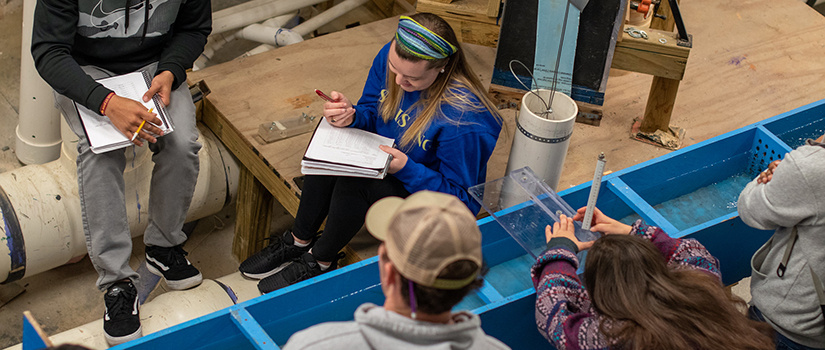Why Study Civil Engineering?
Civil engineering is everywhere: the buildings in which we live and work, the roads on which we travel, the water we drink, the bridges we cross. Civil engineering is the planning, design and construction of projects that define our civilization. Civil engineers have built landmarks that now stand as tributes to the profession's creative spirit and ingenuity.
Our Civil Engineering undergraduate program will prepare you for a successful career in civil, structural, environmental, transportation, water resources or geotechnical engineering.
Civil engineers analyze, plan, design, and build structures such as buildings, bridges,
dams, tunnels and roads. They create infrastructure systems for personal and mass
transportation. Their work contributes to the management of water resources and natural
hazard protection. They provide for environmental control and remediation of both
the natural and constructed environment. Civil engineers also manage urban planning
and public works projects, perform air quality monitoring and plan and design waste
collection and handling systems.
Curriculum
Civil engineering is one of the broadest engineering disciplines. Our civil engineering curriculum provides a strong foundation in the core areas of civil engineering, including structural, environmental, transportation, water resources, and geotechnical engineering. The curriculum also leads to specialization in one of these areas for you to enhance your competitiveness in your particular field of interest.
Major subjects included in the civil engineering curriculum include:
- Introduction to Civil Engineering
- Statics and Mechanics of Solids
- Computational Methods for Civil Engineering
- Engineering Graphics and Visualization
- Civil Engineering Materials
- Structural Analysis
- Geotechnical Engineering
- Transportation Engineering
- Environmental Engineering
- Water Resources Engineering
- Systems Applications in Civil Engineering
- Civil Engineering Design
- Civil Engineering Distribution Electives
- Engineering, Science and Mathematics Electives
The curriculum also includes the Carolina Core, foundational math and science courses, and technical and engineering electives. Independent study and special topics courses also provide unique learning opportunities.
Visit Undergraduate Curricula and Courses for additional details.
Electives and Specializations
Civil engineering electives ensure that you will have a deep understanding in four of the five areas of civil engineering: environmental, geotechnical, structural, transportation and water resources. Additional engineering, science and mathematics electives allow you to either broaden your career preparation or to specialize in a particular subfield of civil engineering.
Areas of specialization and career paths include:
Environmental engineers work in a variety of settings to develop solutions to environmental problems, from safe drinking water to climate change to environmental sustainability.
Geotechnical engineers ensure that the foundations for built objects ranging from streets and buildings to runways and dams, are solid. They focus on how structures built by civil engineers, such as buildings and tunnels, interact with the earth.
Structural engineers design and assess major projects, such as buildings, bridges and dams, to ensure their strength and durability. They also manage construction projects, ensuring that they are scheduled and built in accordance with plans and specifications.
Transportation engineers plan, design, operate and maintain the systems that keep us moving. These range from streets and highways to airports, mass transit systems and harbors.
Water resource engineers design systems for municipal and industrial water supplies and industrial wastewater treatment, and they research the environmental impact of proposed construction projects.
Capstone Design
The civil engineering capstone design experience pairs teams of students with a project sponsor to address real-world problems. These projects are complex and involve multiple subfields of civil engineering. Students master the ability to manage, plan and execute engineering projects. This capstone experience integrates design with engineering ethics, written and oral communications, and an understanding of the social impact of engineering decisions and projects. Recent capstone design projects in civil engineering include:
- Clemson Road at Sparkleberry Lane Intersection Improvements
- Killian Crossing Site Development Project
- Rocky Branch Upgrade
- SEC Nexton Parkway Interchange
- US 21 Over I-26 (Exit 119) Interchange Improvement
Extracurriculars
Civil engineering students participate in a variety of clubs including our student chapters of:
- American Society of Civil Engineers (ASCE)
- American Railway Engineers and Maintenance-of-Way Association (AREMA)
- Engineers Without Borders-USA (EWB-USA)
- Institute of Transportation Engineers (ITE)
Undergraduate researchers can get involved on a volunteer, course credit or paid position basis. Research areas include the development of advanced materials and non-destructive evaluation techniques, novel approaches to improve the efficiency and safety of the transportation network, performance and condition assessment and safety of railways, and physical modeling of geosystems subjected to natural hazards including floods, hurricanes, and earthquakes.
With other undergraduates in our college, civil engineering students take full advantage of living-learning communities, mentorship opportunities, study abroad, intramurals, internships, just hanging out with friends, and more.
Visit Student Experience to learn more.
